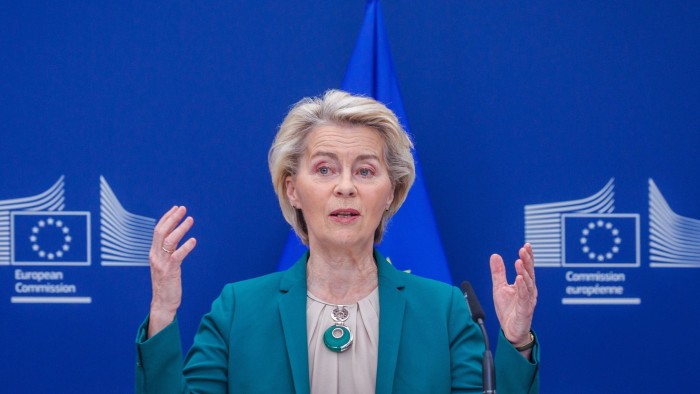Good morning. News to start: German defence minister Boris Pistorius has said it’s time for European arms companies to stop complaining and start delivering, telling the Financial Times that Berlin’s military spending splurge meant the industry had no more excuses for slow production.
Today, our reporters bring you up to speed on a busy weekend in the EU-US trade stand-off as Brussels shrugged off Donald Trump’s latest threat, and Laura joins our tech correspondent to report on new guidelines to protect kids online being unveiled today.
Hold fire
To retaliate, or not to retaliate — that is the question occupying EU trade ministers today, as they meet in Brussels to discuss Donald Trump’s tariff war, write Andy Bounds and Alice Hancock.
Context: The US president upped the pressure on the EU on Saturday by announcing 30 per cent “reciprocal” tariffs from August 1. Months of negotiations between the US and the EU aimed at securing a trade deal have so far only resulted in raising the tariff threat from the original 20 per cent.
In response to the latest increase, European Commission president Ursula von der Leyen yesterday said that plans to hit €21bn of annual US imports with counter-tariffs tomorrow would be delayed.
She said the EU would keep talking until next month’s deadline.
Two diplomats said a second retaliation package, expected to cover €72bn of annual US imports, would be sent to member states for deliberations today.
EU ambassadors met yesterday to be briefed on the talks, and were largely supportive of the commission’s current approach, according to people familiar with the discussions.
Austrian Chancellor Christian Stocker said Trump’s announcement was “regrettable”, adding: “the EU will respond in a united manner.”
But some governments are growing impatient with the passivity.
“It’s quite embarrassing how timid and powerless we are being in this process,” said one senior EU diplomat. “We were told it would be a negotiation between partners but it’s basically us sitting and waiting for [Trump] to make a decision.”
“Countermeasures will have to come if negotiations fail,” another said.
One unspoken fear is that Trump would retaliate in other ways, for instance cutting US arms sales to Ukraine or pulling troops out of Europe. “He has escalation dominance,” said a third EU diplomat.
“The context of the war in Ukraine inevitably limits the scope for action and everyone is facing the challenge of dealing with a mad rhino,” said Ignacio Garcia Bercero, a former commission official and fellow at the Bruegel think-tank.
Business leaders and agricultural groups have also lobbied against tariff measures that could prompt Trump to respond with even higher levies. One said they would prefer the certainty of fixed tariffs to constant changes (though they expected 10 per cent, rather than the latest figure).
As ministers trickle in for today’s meeting, expect public declarations that the EU is ready to respond. But in private, most will endorse the commission’s cautious moves and pray the bond and stock markets come to their aid.
Chart du jour: Disconnected
The Netherlands is among the fastest European countries to electrify critical parts of the economy, but grid bottlenecks are contributing to high electricity costs.
Verified
Five European countries will start testing a new age verification app to better protect children online, write Barbara Moens and Laura Dubois.
Context: The EU’s tech chief Henna Virkkunen has made the digital protection of minors a key focus. Several tech companies, such as Meta and TikTok, are already under investigation for their potentially addictive designs.
Today, Virkkunen and Denmark’s minister for digital affairs Caroline Stage will announce new guidelines for protecting minors online, as well as a prototype for an age verification app.
Denmark, France, Italy, Spain and Greece will take part in the pilot for the age verification app, according to people familiar with the launch.
The app, a precursor to the EU’s digital identity wallet due in 2026, will allow users to verify their age without disclosing personal information to platforms. The EU’s idea is to make this the “gold standard” for age assurance online, as it doesn’t allow tracking individual users.
In addition to that, the guidelines to be published today will provide recommendations on addressing addictive design of online platforms, cyberbullying, unwanted contact from strangers and harmful content, according to a draft seen by the FT.
Virkkunen has been urging tech companies to voluntarily adopt measures to better protect children rather than wait for governments to step in. “Platforms have no excuse to be continuing practices that put children at risk”, Virkkunen said.
What to watch today
-
Nato secretary-general Mark Rutte travels to Washington for a two-day visit.
-
EU trade ministers meet.
-
EU agriculture and fisheries ministers meet.
Now read these
Are you enjoying Europe Express? Sign up here to have it delivered straight to your inbox every workday at 7am CET and on Saturdays at noon CET. Do tell us what you think, we love to hear from you: europe.express@ft.com. Keep up with the latest European stories @FT Europe









